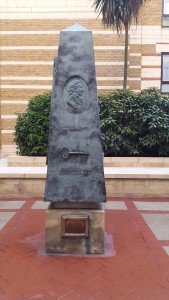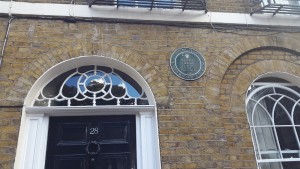All of our first year law undergrads took part in an exercise in week one of their LLB where they escaped City and went to visit a number of buildings of significance in the local area, before tackling some research questions.
They were then asked to write a blog post inspired by their travels. 21 winners were selected from all those posts submitted – this is one of those – thanks to Alyssa Zaman-Choudhary.
One of the things I have always admired about London is that alongside all its diversity and culture, is its vivid history. Unfortunately most of us don’t realise that the history surrounds us on a daily basis. We walk past buildings that just look like a pile of old bricks. But in reality, some of these buildings are significant and make London what it is today. I had the opportunity to visit 4 different places in the surrounding area of Angel, which got me thinking about how they linked with the law.
Where I went:
 The first place we visited was the Statue of Thomas Paine in Angel court. Now, at first glance at the statue I wasn’t completely satisfied. I expected something extravagant but I didn’t see that. But after a few minutes of looking at the encryptions and the face carved into the statue I realised how interesting it was.
The first place we visited was the Statue of Thomas Paine in Angel court. Now, at first glance at the statue I wasn’t completely satisfied. I expected something extravagant but I didn’t see that. But after a few minutes of looking at the encryptions and the face carved into the statue I realised how interesting it was.
After doing some research I was able to find out that Thomas Paine was a very important figure in British (and American) history. Essentially he led the rebels (America) to fight for their independence from the United Kingdom. He did this by creating a book but kept it anonymous, as he would’ve been prosecuted for treason. Which made me think how despite how big of a crime he was committing here in the UK, he was doing something good for another country. And it could be argued that the independence from the UK was the best thing to ever happen to the United States of America.
What was also peculiar was the key carved into the statue. Which got me thinking that how the key was the opportunity for the Americans to escape and gain independence. But the other side of the argument could be how the key represents how America was under lock and key under the power and ruling of the UK and they needed a miracle (in this case Thomas Paine) to push them to battle.
 Another place that we visited which stood out to me on this trip was 27B Canonbury Square. I was surprised to find that the famous playwright George Orwell had lived here. For me his book Nineteen Eighteen Four was an important piece of writing during my A-Levels. The book itself made me realise how easy it is to predict the future, and substantially our present; in regards to the way the government, the police force and the law control us.
Another place that we visited which stood out to me on this trip was 27B Canonbury Square. I was surprised to find that the famous playwright George Orwell had lived here. For me his book Nineteen Eighteen Four was an important piece of writing during my A-Levels. The book itself made me realise how easy it is to predict the future, and substantially our present; in regards to the way the government, the police force and the law control us.
Now who is to say this is a bad thing? Maybe it is a good thing seeing as we are all potentially deviant- as my previous studies have shown that conforming is not a natural attribute yet we still do it. Of course it is much more serious, if we could all commit deviant acts maybe we would, but morals have been set in place by society and if we don’t follow them there are consequences. Maybe not actual consequences set by the law when we break a law, but we would get looked down upon if we were to go against the norms and values set by society.
Which brings me to the point where Orwell was arrested for simply being “drunk and incapable” and did it “in order to get a taste of prison life” ( (Flood, 2014). Is it that easy for someone to manipulate the law and gain something for himself? Should people be imprisoned for a crime even if they did it deliberately? Does intention even come into account? Or should they be punished just as harshly as those who committed the crime with an alternative intention? The law is complicated, and with reason. Two people who committed the same crime could have completely different outcomes based on evidence or whether it was indirect/direct intention (or recklessness).
My Passion for Law:

I find the law remarkable as every case is different and distinct in its own way and we have the pleasure of spending our time researching these cases and surrounding ourselves with the very decisions of them. The law is always changing and it is near impossible to know everything, but that’s the beauty of it.
We can divulge into different parts of interest, things that actually get us thinking about how we live.
Questions arise all the time; are we actually free in our country? Should we get rid of the Human Rights Act 1998? Should Marijuana be legalised? Is enough being done to prosecute those who have committed sexual offences?
The list is endless and its up to us to make a difference whether its small or big. I want to make an impact on this world and leave a mark-for the good.


A well written piece that is eye opening and actually inspires us all to do more by pausing for a moment and looking what is around us …each moment becomes a time in history . Well done Alyssa .